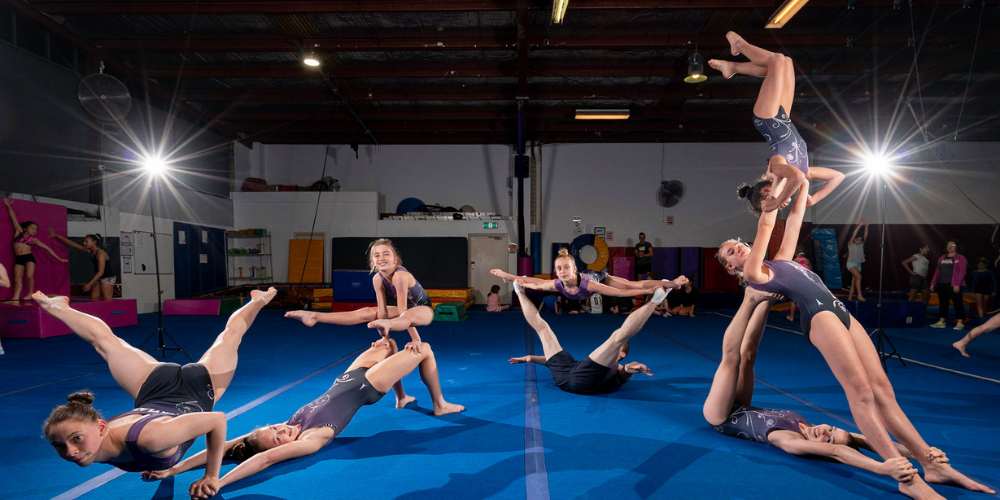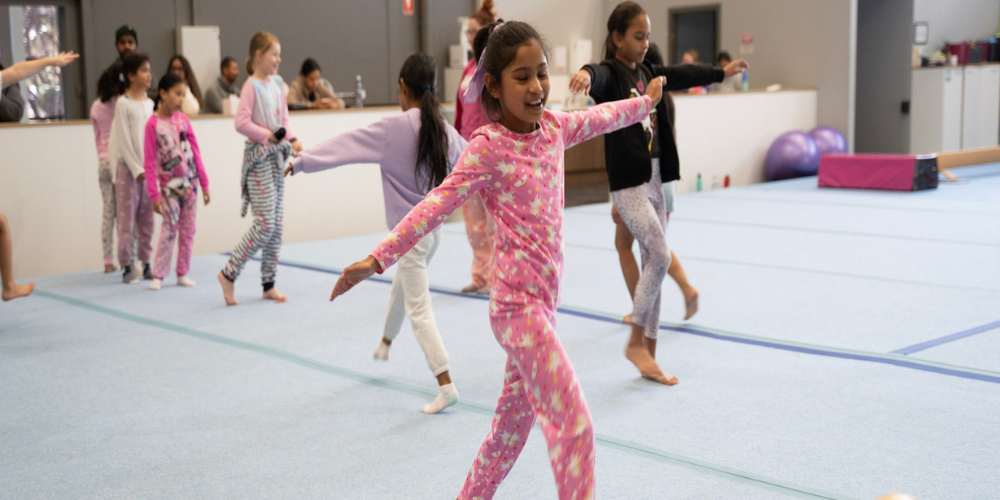Gymnastics is like a beautiful dance full of elegance and power that has enticed people for a long time. Gymnasts do amazing things, like flipping on the floor and leaping into the air with jaw-dropping leaps. But you know what? Behind all that excellence is hard work, practice, and perfecting their techniques.
Imagine yourself as a young gymnast learning somersaults and twists. You follow a certain approach that helps you gradually improve. Each level you finish is like ascending a ladder, with new tasks and goals to help you become a skilled gymnast.
Here's an interesting question: Can a gymnast skip certain steps and go to a higher level? It's like asking whether you can skip a few stairs and reach the top level faster!
In this blog, we'll discover more about gymnastics and if it's possible to skip stages. We'll look at the fascinating road to becoming a terrific gymnast and see if there are any shortcuts or surprises along the way. So be ready to tumble and fly with us as we discover the secrets of gymnastics and learn how incredible athletes achieve new heights!
What Do Gymnastic Levels Look Like?
Gymnastic levels are like chapters in an amazing book of skill development and fun! They help gymnasts in learning and grow systematically, much like solving puzzles or mastering new techniques in a video game. Each level has its own set of fascinating challenges and objectives to complete.
The structure of gymnastics levels varies based on the gymnastics program or organization. However, gymnastics-level structure generally follows a progressive system that begins with the fundamentals and progresses to more sophisticated abilities. The following is a general outline of gymnastic levels:
- Level 1: For beginners, this is the beginning point. Gymnasts acquire fundamental abilities, including forward rolls, backward rolls, cartwheels, and basic leaps. Routines are straightforward and focus on building body awareness and coordination.
- Level 2: Gymnasts in this level build on the abilities they gained in Level 1. They begin by practicing abilities such as handstands, bridges, and pullovers on bars. Routines grow slightly more difficult when new elements are introduced.
- Level 3: Gymnasts continue to evolve and learn more sophisticated techniques. Round-offs, back handsprings, and back hip circles on bars may be introduced at this level. Floor routines grow in length and complexity.
- Level 4: Gymnasts perfect their fundamental skills and begin studying more harder ones at this stage. They might practice aerials, front handsprings, and back tucks on the floor. With numerous talents in succession, bar routines grow increasingly difficult.
- Level 5: Gymnasts at Level 5 continue to refine their technique and execution. Front tucks, back layouts, and giants on bars are all introduced. Routines get increasingly complicated, displaying a variety of talents and dance aspects.
- Level 6: At this level, gymnasts focus on achieving difficult abilities such as back tucks, front aerials, and kips on bars. In addition, they show greater strength and flexibility in their activities.
- Levels 7 and up: Gymnasts rise to higher levels as they progress, such as 7, 8, 9, and 10. These levels include increasingly challenging abilities and routines, such as back layouts with complete twists, bar release movements, and more sophisticated combinations on all apparatuses.

Why Skip a Gymnastic Level?
Skipping a gymnastics level is uncommon, but it can happen for some reasons, depending on the gymnast's talents and circumstances. Here are some of the reasons why a gymnast could opt to skip a level:
Advanced Skills
Coaches may consider promoting a gymnast to a higher level if they have mastered the abilities and requirements of their current level and are easily completing more advanced skills.
Talent and Potential
At a young age, certain gymnasts demonstrate great talent and potential. If their trainers detect their exceptional ability, they suggest bypassing a level to expedite their development and guarantee they receive the necessary instruction to realize their maximum potential.
Age and Physical Fitness
In some cases, a gymnast may be too old or too physically mature for their present level. In such instances, bypassing a level may let them compete with gymnasts of comparable age and physical preparedness.
Competitive Advantage
Gymnasts may choose to bypass a level to compete at a higher level. For example, suppose a gymnast has only a few years left in a certain age group. In that case, they could move up to be eligible for more competitive possibilities.
Motivation & Challenge
Skipping a level can provide gymnasts with a fresh challenge while motivating them. If gymnasts feel unchallenged at their present level, stepping up can rekindle their love of the sport.
Training Efficiency
Skipping a level can help gymnasts practice intensively and develop rapidly by streamlining their training schedule and preventing them from duplicating previously mastered skills.
Pros of Skipping Gymnastic Level
Under the correct conditions, skipping a gymnastic level might provide various benefits. Here are several advantages to skipping a gymnastic level:
Greater Difficulty
Moving up a level exposes gymnasts to more difficult skills and routines. It enables students to push their limitations, put their abilities to the test, and stay motivated throughout their gymnastics adventure.
Accelerated Development
A gymnast's skill development can be accelerated by skipping a level. Moving up can ensure they continue to grow at a speed that matches their talents if they have already mastered the skills of their current level.
Enhanced Confidence
Skipping a level successfully might increase a gymnast's confidence. Knowing they have the talent and competence to compete at a higher level can inspire a sense of success and faith in themselves.
Opportunities for Competition
Moving up the ranks can provide access to more competitive opportunities. Competing against tougher opponents can motivate gymnasts to up their game and perform to their full potential.
Optimized Training
Gymnasts can focus on acquiring new and more sophisticated abilities by skipping repetitious levels. This enables trainers to personalize training regimens to the gymnast's advanced talents and target areas for improvement.
Exposure to Advanced Techniques
Being at a higher level exposes gymnasts to more complex techniques and coaching. They will be able to learn from skilled trainers and witness other excellent gymnasts, which will inspire and improve their performance.
Age-appropriate Challenges
Skipping can place a gymnast in a group with gymnasts closer to their age and level of readiness if they are older or more physically developed for their present level.

Cons of Skipping Gymnastic Level
While there are certain advantages to skipping a gymnastic level, there are also some disadvantages to consider before making such a decision. Here are some disadvantages of skipping a gymnastics level:
Skill Gap
If you complete a level, you may take advantage of learning important core skills and practices generally taught at that level. As a result, the gymnast may need help establishing a solid foundation for advanced moves, potentially impeding their overall progress and performance.
Safety Concerns
Moving up a level without fully learning core abilities can result in safety hazards. Attempting more advanced moves without a solid foundation might increase the risk of injury because the gymnast may not have gained the requisite control and technique to execute the feats safely.
Physical Preparedness
Moving up to a higher level frequently necessitates specific physical characteristics such as strength, flexibility, and conditioning. If the gymnast has yet to acquire these characteristics fully, they may struggle to execute the more challenging abilities of the advanced level, perhaps resulting in frustration and setbacks.
Mental Preparedness
Skipping a level can make you feel overwhelmed or unprepared. The gymnast may be confronted with routines and skills they need to be more mentally prepared to manage, affecting their confidence and pleasure in the sport.
Slow Development
Rapid progression may hinder the gymnast's ability to master their existing talents fully. The gymnast's overall growth may be hampered if they do not have enough time to perfect their methods and build on their strengths. This will impair their ability to perform at their best.
Competitive Challenges
Competing at a higher level against gymnasts with more experience and skill might be scary. The gymnast may struggle to keep up with the competition, affecting their competitive performance and causing a drop in self-esteem.
Alternatives to Skipping Levels
If skipping a gymnastic level is not the chosen option or practicable for a gymnast, there are various other options. Here are some other alternatives:
Encourage Mastery of Skills
Rather than hurrying ahead, concentrate on assisting your child in mastering the skills and routines at their current level. Building a solid foundation will give them the confidence and readiness to face greater challenges in the future.
Take One Step at a Time
Allow your child to improve gradually by teaching them more complex skills appropriate for their current level. It's a process of gaining new tricks and skills while keeping in the appropriate zone, similar to leveling up in a favorite game.
Showcase Their Talent
Look for ways to highlight your child's abilities without legally skipping stages. Without the burden of official competition, exhibition events or showcases let them shine and perform more advanced routines.
Seek Out Challenging Opportunities
Consider inviting competitions with many levels of competition. This allows your child to compete against more advanced gymnasts while remaining officially registered at their current level, which adds excitement and motivation.
Set Personal Goals
Set personal goals with your child within their present skill level. Highlight the significance of progress and improvement while also appreciating their accomplishments along the road.
Frequently Asked Question
Is it common for gymnasts to skip levels?
Skipping levels is uncommon and is usually reserved for gymnasts with great talent and progress. Most gymnasts work through the levels, developing a solid foundation of skills and techniques.
How can coaches know if a gymnast is ready to go up a level?
A gymnast's readiness to skip a level is determined by their mastery of skills, consistency in execution, strength, flexibility, and mental fortitude. They may also consider the gymnast's competitive performance and general improvement.
What should gymnasts consider when skipping a level?
Gymnasts should consider skipping a level based on their preparation, technical proficiency, and confidence. They must share their objectives and aspirations with coaches and parents to make an informed decision consistent with their long-term development.
Is there an age limit for skipping stages in gymnastics?
The age restrictions for skipping levels might vary according to the gymnastics organization or program's rules and regulations. Some may have age-specific requirements for progressing to higher levels. Still, others may take a gymnast's abilities and skill level into account regardless of age.
Conclusion
The choice to skip a gymnastics level is important. It requires careful thinking and teamwork between parents, instructors, and gymnasts. Advanced gymnasts may find that skipping a level presents new chances and challenges. Still, it is crucial to make this choice carefully and with consideration for the gymnast's overall growth and well-being.
Before skipping, determine whether your gymnast has fully mastered their current level. Consider physical and mental readiness, and seek advice from coaches. Skipping should align with long-term goals and foster balanced advancement without jeopardizing the child's safety or overloading them. Maintain their enthusiasm for gymnastics and consistent improvement.
On the other hand, if continuing with regular progression is the best course of action, keep in mind that every level is a step toward perfection and that every success is something to be proud of. Let's work together to encourage and mentor our young gymnasts as they succeed and shine in the sport they adore!

